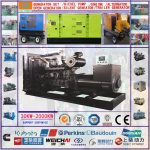Introduction
Diesel generators are an essential component of many industries, providing a reliable source of backup power in case of grid failures or emergencies. The durability and reliability of diesel generators are crucial factors that determine their effectiveness in ensuring uninterrupted power supply. In this article, we will explore the various durability standards that diesel generators must meet to perform optimally and reliably over an extended period.
Importance of Durability in Diesel Generators
Durability is a key consideration when selecting a diesel generator for any application. A diesel generator must be able to withstand the rigors of continuous operation, adverse weather conditions, and varying loads without compromising its performance. The failure of a diesel generator can have serious consequences, leading to downtime, loss of productivity, and potential safety hazards.
Durability Standards for Diesel Generators
There are several durability standards and certifications that diesel generator manufacturers adhere to ensure the quality and reliability of their products. These standards cover various aspects of the generator's design, construction, performance, and testing. Some of the key durability standards for diesel generators include:
1. National Fire Protection Association (NFPA) Standards: The NFPA standards provide guidelines for the installation, maintenance, and testing of emergency power supply systems, including diesel generators. These standards ensure that diesel generators are designed and installed to meet specific safety and performance requirements to minimize the risk of fires and other hazards.

2. International Organization for Standardization (ISO) Standards: ISO standards cover a wide range of quality management systems, including those related to diesel generator manufacturing. ISO certification indicates that a manufacturer has implemented processes and controls to ensure the quality, durability, and reliability of their products.
3. American National Standards Institute (ANSI) Standards: ANSI standards outline the requirements for the design, testing, and performance of diesel generators to ensure they meet industry-wide safety and quality standards. Compliance with ANSI standards demonstrates that a diesel generator has been rigorously tested and meets the necessary durability criteria.
4. Underwriters Laboratories (UL) Certification: UL certification is a globally recognized mark of product safety and quality. Diesel generators that are UL certified have undergone extensive testing to verify their durability, performance, and compliance with safety standards.
5. European Committee for Electrotechnical Standardization (CENELEC) Standards: CENELEC standards cover the design, construction, and testing of electrical equipment, including diesel generators. Compliance with CENELEC standards ensures that diesel generators meet the necessary durability and safety requirements for use in Europe and other regions.
Design and Construction Considerations for Durability
In addition to meeting industry standards and certifications, the design and construction of a diesel generator play a critical role in ensuring its durability. Some key design and construction considerations that contribute to the durability of a diesel generator include:
1. Engine Quality: The engine is the heart of a diesel generator and plays a crucial role in its performance and reliability. High-quality engines from reputable manufacturers are essential for ensuring the durability of a diesel generator.
2. Cooling System: Adequate cooling is essential to prevent overheating and ensure the efficient operation of a diesel generator. A robust cooling system that can withstand high temperatures and continuous operation is vital for the durability of the generator.
3. Enclosure and Housing: The enclosure and housing of a diesel generator protect it from environmental factors such as dust, moisture, and extreme temperatures. A durable enclosure made of high-quality materials ensures the longevity of the generator.
4. Fuel System: The fuel system of a diesel generator must be designed to deliver a consistent supply of fuel to the engine under varying load conditions. A reliable fuel system is essential for the durability and performance of the generator.
5. Control System: The control system of a diesel generator regulates its operation and monitors key parameters such as voltage, frequency, and load. A robust control system with advanced features enhances the durability and efficiency of the generator.
Testing and Performance Evaluation
Testing and performance evaluation are essential steps in ensuring the durability of a diesel generator. Manufacturers conduct various tests to evaluate the performance, reliability, and durability of their generators under different operating conditions. Some common tests conducted on diesel generators include:
1. Load Testing: Load testing involves subjecting the diesel generator to varying loads to evaluate its performance and response. This test helps identify any issues related to the generator's capacity, voltage regulation, and fuel consumption.
2. Environmental Testing: Environmental testing involves exposing the diesel generator to extreme temperatures, humidity, and other environmental factors to assess its durability and performance under harsh conditions. This test helps ensure that the generator can operate reliably in any environment.
3. Endurance Testing: Endurance testing involves running the diesel generator continuously for an extended period to simulate real-world operating conditions. This test helps identify any potential issues related to the generator's components, such as the engine, alternator, and cooling system.
4. Noise Testing: Noise testing evaluates the sound levels produced by the diesel generator during operation. Excessive noise can be a sign of poor design or construction, affecting the durability and user experience of the generator.
Maintenance and Service Requirements
Regular maintenance and servicing are essential for ensuring the durability and performance of a diesel generator. Proper maintenance practices, such as oil changes, filter replacements, and inspections, help prevent premature wear and damage to the generator's components. Additionally, routine servicing by qualified technicians can identify and address any issues before they escalate and impact the generator's durability.
Conclusion
Durability is a critical factor in the performance and reliability of diesel generators. By adhering to industry standards, implementing robust design and construction practices, conducting thorough testing, and following proper maintenance procedures, manufacturers can ensure that their diesel generators meet the necessary durability criteria. 600kw generator in a durable diesel generator can provide peace of mind and assurance of reliable backup power in times of need.
